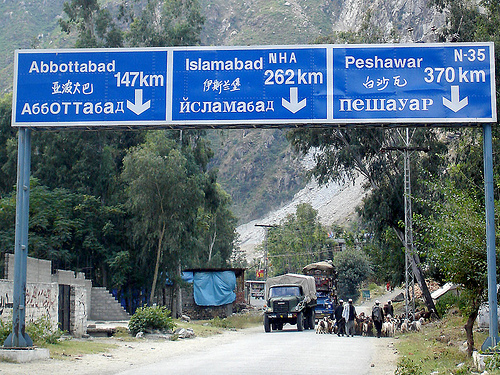In my reporting, I often hear that the major threat to India's security is the unevenness of its development.
Many India-watchers express this concern in terms of wealth disparity, predicting political upheaval from those (scheduled castes, religious minorities or rural tribes) left outside the burgeoning middle class. Says Columbia's Partha Chatterjee, "This sense of being deprived could lead to enormous social unrest."
From what I have seen, this prediction does not quite fit.
To be sure, India is still a poor nation, but its middle class is growing, not shrinking, and set to exceed 50% of the population by 2030, according to author Gurcharan Das. Consequently, social and political capital has migrated to the middle. And, as Vali Nasr would remind us, middle classes (unlike elites) usually push for the kind of social reforms that trickle down. There is much handwringing about the possibility that the middle-class will be too apathetic to exercise this power, but in reality, both the rise of the BJP on the right, and the reinvention of the Congress on the centre-left are evidence of an active middle-class voting base.
Moreover, the poor can demand redistributive policies all by themselves. Says political analyst Karan Thapar, "The Congress Party made promises of reform to the business community [before the 2009 election], and so many of us predicted they would move away from the Left after the election, but they haven't. The "Am Admi" ["Common Man,"] wing of the party is still in control." The threat of social unrest adds urgency to this populist agenda, but because of that threat, unrest itself is unlikely to explode. Economic unrest is precisely the kind of crisis which democracies are designed to respond to. It is a conflict over interests, one that can be defused by policy concessions.
Democracy is key to defusing unrest over the messiness of India's economic transformation. It is also central to India's ability to compete for attention and investments with larger, faster China, to its claim to nuclear legitimacy, and to its access to international sympathy in its struggle with terrorism. Says Chatterjee, "The democracy card is played for whatever it is worth, precisely to make the point that India could be a completely acceptable member of this group of global powers."
The biggest threat to India's security thus lies not with those left out, economically, from its growth, but with those disconnected, politically, from its democracy. Most of the people--officials, journalists, professionals, and academics--I've spoken to believe the unevenness that matters is not monetary, but geographic: between the central government and various provinces interested in running their own affairs.
These range from the Telangana separatists who wish to split off into their own province, to the Maoists who wish to rule several existing provinces according to cowboy populism, to the North-eastern provinces that demand to leave India altogether. Though these movements recruit followers from the economically down-and-out, their central demand is a political one. It's the political nature of the movements that makes even their economic claims lethal.
Making concessions to political uprisings does not defuse the conflict, because the concession to be made--a political break--precludes any state attempts to address specific grievances. Political unrest showcases, by its very existence, the limitations of the state in which it occurs. "It reminds us," says a dispirited civil servant from the troubled province of Bihar, "that India is sometimes just a functioning anarchy."
Such fissures in Indian democracy pose a security threat on several levels. Firstly, India's growth potential shrinks if one-third of the country is removed from the national economy, off-limits to employers or developers. Secondly, India's appeal to international investors declines if its major bargaining chip—a stable democracy—cracks. Together, these threats can undermine the government's ability to deliver the 8-9% annual growth that has become India's norm. "Voters," says Thapar, "would tolerate nothing less." Failure to deliver overall growth, affecting the middle-class majority, could spark the kind of social unrest that pure economic inequality cannot.
Moreover, when there's economically-motivated unrest in regions cut off politically from the democratic system, there is no nonviolent avenue for expressing that distress and no active state presence that can respond to specific economic interests. The political, and violent, nature of the unrest becomes self-perpetuating.
Finally, the withdrawal of state writ leaves these regions vulnerable to foreign influence. Indeed, New Delhi maintains that neighbors--Nepal, China, Pakistan, Bangladesh--are responsible for instigating the insurgencies. Historical alliances between these nations surrounding India do not help assuage Indian fears.
Pakistani politician Mushahid Hussain, whose Islamabad-based thinktank focuses on relations with China, admits Pakistan may leverage its alliances as a negotiating tool: "Each society has its fault lines. In India, it is these insurgents. And we've not yet done enough to exploit that. They should be nervous about collusion between Pakistan and China. It may mean they would want to talk to Pakistan, to de-link that collusion if there is some."
Problematically, if such external threats to India manifest themselves as internal political fractures with economic effects, India cannot necessarily count on its own allies—powers outside the region who are often drawn to India because it is a stable and growing democracy—to step in when stability and growth are challenged. As a result, many Indians now question the efficacy of alliance with the United States. Says Hemant Batra, a corporate lawyer and political consultant in Delhi, "India is today the most isolated country within its region."
The government is starting to pay attention to these concerns. In the last few weeks, Indian officials have held major diplomatic meetings with leaders from Nepal, Pakistan, China and Bangladesh and 2010 looks to be a year of shifting regional ties. If policy changes emerge, I'll be blogging them here; in the meantime, I am devoting a significant share of my reporting to the fissures in Indian federalism. I'll be venturing up and east myself in the coming weeks, and will have more to say on the subject when I return.




